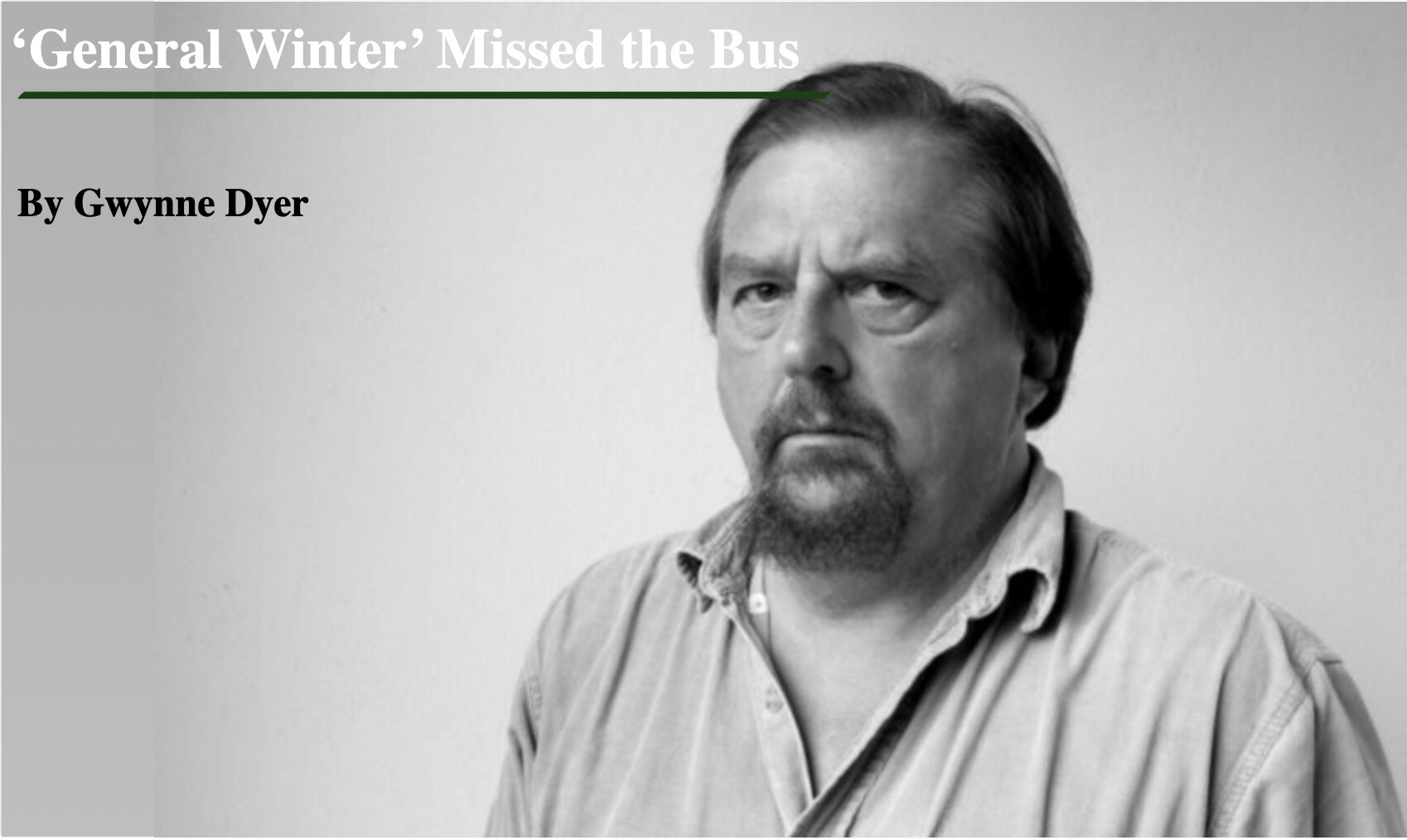‘General Winter’ Missed the Bus
Gwynne Dyer
“The cold is coming soon,” gloated former Russian president Dmitry Medvedev last June. He predicted that the citizens of the European Union, deprived of the Russian gas that normally supplied about 40% of their energy, would be freezing in their homes when ‘General Winter’ arrived.
At that point, he suggested, their support for Ukraine would wither and they would beg Moscow to restore their gas supply. President Vladimir Putin’s price would be an end to NATO support for Ukraine, and the EU governments would gladly pay it. Game, set and match to Moscow.
It seemed a plausible argument at the time. Frans Timmermans, the vice-president of the European Commission and therefore the second most senior EU official, certainly took the threat seriously.
“I’ve been in politics long enough to understand that people worry most about the immediate threat (being cold) and not about the long-term crisis (the Russian conquest of Ukraine and the collapse of NATO),” he said in July.
“If we can’t guarantee that people will be warm enough, then society is on edge…Putin is using all the means he has to create strife in our societies, so we have to brace ourselves for a very difficult period.”
Indeed, fear of popular pressure to turn the Russian gas back on could explain why explosions destroyed the Nord Stream gas pipelines last September. They were built to carry Russian gas under the Baltic Sea to western Europe, and anonymous “US intelligence officials” recently suggested that a “pro-Ukrainian group” was to blame for the explosions.
Ukrainian presidential spokesperson Mykhailo Podolyak flatly denies any Ukrainian involvement in the attack, but Ukrainians certainly had a more plausible motive to do it than anybody else. By making it impossible for Russia to turn the gas back on, they would remove any European temptation to make a deal with Russia.
But in the end there was no significant popular pressure to get the Russian gas back, because the EU has done a remarkably effective job of getting more gas from elsewhere and cutting its own use of gas. The winter is almost over, and there has been no energy crisis at all.
There is an element of luck in that outcome. This winter has been quite mild in Europe, which cut the demand for gas to heat European homes, but home-heating was the easiest part of the problem to solve. If you have to turn the thermometer down, you can always just put on more clothes.
The real crunch was always going to be in energy for industry: everything from Dutch greenhouses to German car manufacture to Swedish steel-making. If gas shortages cause production to slow down and people start getting laid off in large numbers, popular anger would mount very quickly. But it just didn’t happen.
Approximately half of the shortfall in gas supply was met simply by sourcing gas from various sources outside Europe, chartering tankers to bring it to Europe as LNG (liquid natural gas), and building huge new facilities in European ports to bring the LNG ashore and re-gasify it. Nobody expected that it could be done that quickly, but it was.
The other half (and this is the interesting bit) was very big and fast cuts in energy use. Germany cut its total gas consumption by 14% last year, the Netherlands managed 22%, and Sweden achieved a remarkable 35% cut. Yet there was no collapse in employment, no major recession – and the gas storage tanks are much fuller than they were at this time last year.
There’s a lesson here that goes far beyond the local context of war and sanctions. When countries are faced with genuine emergencies, they are capable of moving faster and acting more radically than everyday political experience would suggest is possible. They just need the right motivation.
The right motivation, unfortunately, is usually an immediate threat to their security, not a longer-term threat to their very survival. The same European countries have known for decades that their future depends critically on cutting greenhouse gas emissions, and yet they chose to go on relying on Russian gas despite both the climate impacts and the blackmail risk.
We can’t arrange for every other region of the planet to have a similar outbreak of military aggression to startle all the regional players into cutting their emissions as fast as the Europeans have done. It would probably be a bad idea anyway: wars are dangerously unpredictable events.
That leaves us relying on climate-related disasters as the only thing that will force a step-change in emissions reductions. (Just a disaster big enough to get countries moving faster, please, not one so big that sinks us all.) But you already knew that.





